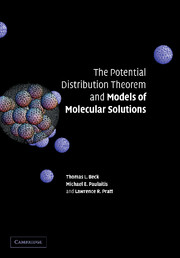5 - Generalities
Published online by Cambridge University Press: 13 August 2009
Summary
The following is a survey of some general and useful relations for evaluating chemical potentials and free energy changes. The number of such relations isn't large, but an overview is warranted here. Evaluations of free energy changes are typically the most basic and convincing validations of molecular simulation research. Calculations of free energy changes are typically more specialized undertakings than unspecialized simulations. If the problem at hand has been well-considered and calculations are to be specially directed to evaluate free energy changes, then thermodynamic or coupling parameter integration procedures are likely to be the most efficient possibilities. They are favorably stratified, they can have low bias, it is clear how computational effort can be added effectively as results accumulate, and they can be embarrassingly parallel. Other methods considered here, such as importance sampling and overlap methods, can be incorporated into thermodynamic integration methods, and can improve the results.
Nevertheless, there are cases where the alternatives to thermodynamic integration would be chosen instead. In the first place, there are many cases where the problem hasn't yet been considered fully enough to establish a natural integration path. But in the second place, it would often be argued that nonspecialized calculations are more efficient because they produce ancillary results too. Furthermore, the success of alternative free energy calculations often depends on some physical insight.
Information
- Type
- Chapter
- Information
- Publisher: Cambridge University PressPrint publication year: 2006
